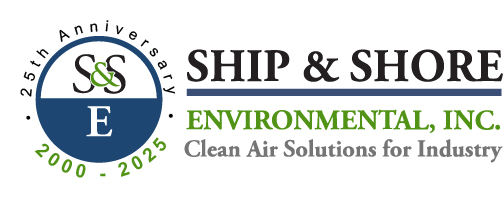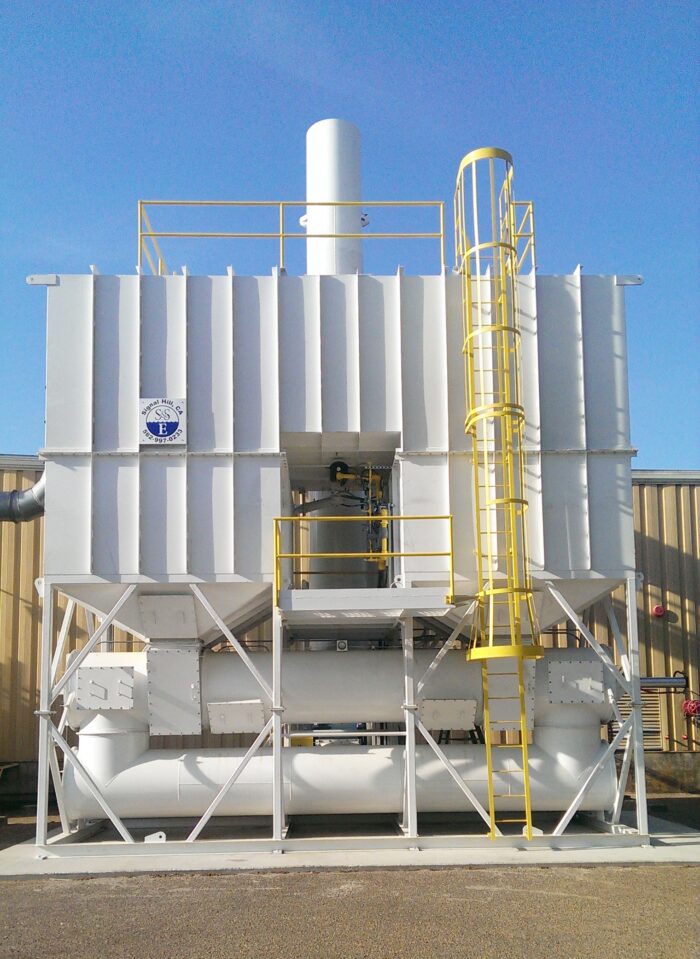RTO Manufacturers for the Fiberglass Industry
Advanced Air Pollution Control for Fiberglass Manufacturing
The fiberglass industry faces unique air quality challenges due to the release of volatile organic compounds (VOCs) and hazardous air pollutants (HAPs) generated during resin application, curing, and finishing processes. Ship & Shore Environmental, Inc. provides Regenerative Thermal Oxidizers (RTOs) engineered specifically for the fiberglass industry, delivering efficient and cost-effective emissions control solutions that ensure regulatory compliance and environmental protection.
Our RTOs for the fiberglass industry are designed to handle complex exhaust streams containing styrene, acetone, and other organic compounds produced during composite manufacturing. With advanced heat recovery technology and durable construction, Ship & Shore systems help fiberglass producers achieve long-term operational efficiency while reducing their environmental footprint.
High-Efficiency Regenerative Thermal Oxidizers for Fiberglass Production
Ship & Shore’s Regenerative Thermal Oxidizers offer a proven solution for fiberglass emissions control. By using regenerative ceramic media, these systems recover and reuse up to 97% of thermal energy, dramatically reducing fuel consumption and operating costs. Each fiberglass industry RTO is engineered to achieve destruction efficiencies of up to 99%, effectively eliminating VOCs and odorous compounds from production processes.
Our systems are designed with the unique needs of fiberglass manufacturers in mind, including fluctuating airflows, variable VOC concentrations, and corrosive exhaust gases. Durable materials of construction and corrosion-resistant coatings ensure long-term reliability in challenging production environments.
Customized RTO Systems for Fiberglass Applications
Every fiberglass manufacturing facility operates differently, and Ship & Shore specializes in custom-engineered RTO solutions tailored to each process. Whether your operations involve continuous sheet molding, pultrusion, or open-mold composite production, our engineering team designs systems that meet your specific performance, space, and energy-efficiency requirements.
Our RTOs can be integrated with additional emissions control equipment, such as scrubbers or filtration units, to address particulates, acid gases, or odors, providing a complete and adaptable air pollution control solution.
Odor and Emission Abatement for Fiberglass Facilities
Fiberglass production often produces strong odors due to the curing and resin-mixing processes. Ship & Shore’s odor abatement technologies—including regenerative thermal oxidizers and wet scrubbers—help reduce odorous emissions and VOCs, improving air quality within the facility and surrounding areas. Our systems are designed to operate continuously with minimal maintenance, ensuring consistent performance and reliability.
Energy Efficiency and Sustainability
Energy consumption is a key concern for fiberglass manufacturers. Ship & Shore RTOs minimize energy use through regenerative heat recovery, allowing the system to operate self-sufficiently once the process air reaches the required VOC load. This high level of thermal efficiency supports both cost savings and corporate sustainability goals, making our solutions ideal for environmentally responsible fiberglass producers.
Comprehensive Support and Service
Ship & Shore provides complete service and maintenance support for RTOs in the fiberglass industry. Our experienced technicians are available 24/7 for installation, preventive maintenance, and emergency repairs. With decades of expertise in emissions control systems, we ensure each RTO operates at peak efficiency for years to come.
Partner with Ship & Shore Environmental
As a leading RTO manufacturer for the fiberglass industry, Ship & Shore Environmental, Inc. combines innovative engineering with proven performance. Our systems help manufacturers achieve regulatory compliance, reduce operating costs, and enhance environmental stewardship. Partner with Ship & Shore to implement an emissions control system designed for lasting performance and sustainable growth.


